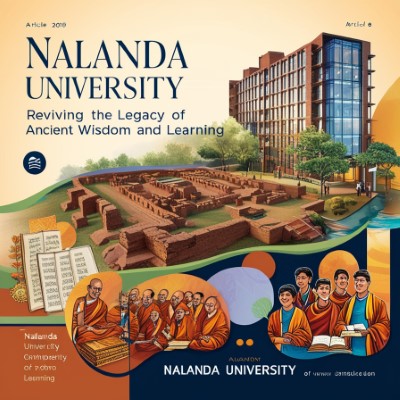Nalanda University was an ancient center of learning in India, located in present-day Bihar. It was one of the earliest residential universities in the world, attracting scholars from across Asia and beyond. Here are key aspects of its history and significance:
Historical Significance and Fame
- Foundation and Age: Nalanda University was established in the 5th century CE during the Gupta Empire. It flourished until the 12th century.
- Scholarly Hub: It was renowned for its extensive library, which housed thousands of manuscripts and texts. Scholars from China, Korea, Japan, Tibet, Mongolia, Turkey, Sri Lanka, and other parts of Southeast Asia traveled to Nalanda for education.
- Curriculum and Faculty: The university offered a wide range of subjects including theology, grammar, logic, astronomy, metaphysics, medicine, and philosophy. Its faculty included some of the most renowned scholars of the time.
- Influence on Buddhism: Nalanda played a crucial role in the spread of Mahayana Buddhism. Many important Buddhist texts and doctrines were developed or studied here.
Historical Documents Highlighting Nalanda’s Importance
- Travelogues: The Chinese pilgrims Faxian (Fa-Hien) and Xuanzang (Hiuen Tsang) visited Nalanda in the 5th and 7th centuries respectively. Their detailed accounts provide valuable insights into the university’s operations and its significance.
- Tibetan Records: Tibetan works, including those by the scholar Taranatha, also discuss Nalanda’s importance as a center of learning.
- Inscriptional Evidence: Various inscriptions and copper plates from the Gupta and later periods mention donations and grants to Nalanda, underscoring its prominence and the support it received from various rulers.
Destruction
Nalanda University was destroyed in the 12th century by an army under Bakhtiyar Khilji, a general of the Ghurid dynasty. The destruction was part of the broader Islamic invasions in the Indian subcontinent, which targeted major centers of Hindu and Buddhist learning. The reasons were both strategic and ideological, aiming to weaken the cultural and intellectual foundations of the region.
Recent News about Nalanda University
Nalanda University was re-established in 2010 as a modern university with the aim of reviving the ancient seat of learning. Here are five recent news articles about Nalanda University:
- June 2024: “Nalanda University Hosts International Conference on Sustainable Development” – The conference focused on global sustainability practices and the role of education in promoting sustainable development.
- May 2024: “Nalanda University Collaborates with Japanese Universities for Research Exchange” – A new partnership was announced to enhance academic exchange and research collaboration between Nalanda and leading Japanese institutions.
- April 2024: “Nalanda University Launches New Centre for Buddhist Studies” – The inauguration of a specialized center dedicated to the study and research of Buddhist teachings and practices.
- March 2024: “Students from Over 30 Countries Enroll at Nalanda University for the Upcoming Academic Year” – Highlighting the university’s growing international appeal and diverse student body.
- February 2024: “Nalanda University to Implement Solar Power Project on Campus” – An initiative to make the university campus more sustainable and reduce its carbon footprint through renewable energy sources.
Nalanda University’s legacy continues to inspire, reflecting its enduring significance in the history of education and its modern resurgence as a center for global learning.
